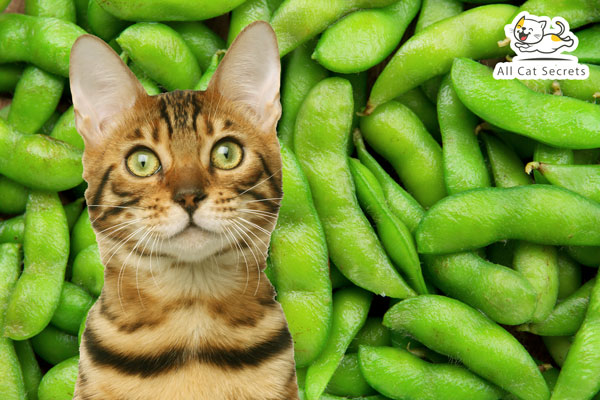Edamame is widely marketed as a healthier replacement for animal products. That’s due to its incredible abundance of plant proteins and a host of other beneficial nutrients. Edamame is remarkably delicious too. Plus, it’s easy to prepare and can last much longer than regular soybeans.
For pet parents who love to cook edamame regularly, there are always the nagging concerns regarding whether animals like cats can also snack on these nutrient-rich vegetables. But can cats eat edamame?
Yes, cats can technically consume edamame. Soybeans have been treated to a degree of negative online publicity in the recent past. However, these cereals are harmless to humans and even non-herbivorous pets like cats and dogs. Besides, edamame packs several vitamins and minerals required for a cat’s healthy growth and development.
But when it comes to plant-based foods like edamame for cats, the cardinal principle of moderation should always apply.
Edamame may not be immediately toxic to cats in small amounts. But feeding large portions of these vegetables to your feline friend could lead to stomach upset and many other medical complications.
Read on as we uncover the interactions between cats and edamame. Some of the areas the article will tackle include the health benefits and side effects of edamame for cats, and how best to share these veggies with your adorable kitto.
Table of Contents
What Is Edamame?
Edamame is a preparation of whole, immature soybeans in the pod. When outside their pods, the beans are commonly called mukimame in Japan. Edamame differ from soybeans primarily in their color.
Soybeans can appear light brown, beige, or tan, whereas edamame are typically green or dark-green in color.
a) Origin and Popularity
Edamame are popularly found in recipes inspired by East Asia cuisines, particularly Japanese and Chinese cuisines.
But due to their incredible nutritional profile, these vegetables are widespread worldwide.
b) Preparation and Serving
Edamame can be prepared using various methods. Common ones include boiling and steaming.
You can also pan-fry or microwave edamame. These two cooking methods are mainly recommended for frozen edamame.

After cooking, the beans are served with salt, saltwater, or other condiments and spices. They’re then eaten as a standalone snack or added to stews, salads, and noodles.
Edamame can be consumed still encased in their pods or after removing them from the pods. There’s also the option of purchasing shelled edamame, which often come without the pods.
What Are the Health Benefits of Edamame for Cats?
As a responsible cat owner who also happens to love edamame, one of the questions you’ll often grapple with is, can I give my cat edamame?
The best way to answer that question is by looking at the potential health benefits of edamame for cats.
First off, it’s important to note that there aren’t many studies on the direct effects of edamame or soybeans in cats. Most studies were performed on humans.
However, it’s possible that edamame could have some health and nutritional benefits for cats, even if not in the exact way these vegetables can benefit humans.
Now, a 100-gram serving (3.5 ounces) of frozen edamame boasts the following nutrients;
- Energy – 507 kilojoules (121 kilocalories)
- Protein – 11.9 grams
- Carbohydrates – 8.9 grams
- Sugars – 2.18 grams
- Dietary fiber – 5.2 grams
- Fat – 5.2 grams
- Water – 72.8 grams
- Vitamin A – 2% of the recommended daily value (RDV)
- Vitamin B1 – 17% of the RDV
- Vitamin B2 – 13% of the RDV
- Vitamin B3 – 6% of the RDV
- Vitamin B5 – 8% of the RDV
- Vitamin B6 – 8% of the RDV
- Vitamin B9 – 78% of the RDV
- Vitamin C – 7% of the RDV
- Vitamin E – 5% of the RDV
- Vitamin K – 26% of the RDV
- Selenium – 1% of the RDV
- Calcium – 6% of the RDV
- Potassium – 9% of the RDV
- Zinc – 14% of the RDV
- Iron – 17% of the RDV
- Magnesium – 18% of the RDV
- Phosphorus – 24% of the RDV
- Manganese – 49% of the RDV
The following are the specific ways edamame may benefit your cat based on selected nutrients in these cereal vegetables;
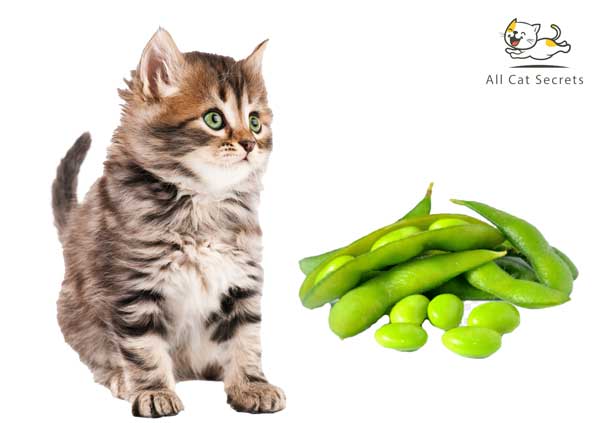
1. Edamame May Support Your Cat’s Digestion
Edamame is loaded with dietary fiber. Fiber plays numerous crucial roles in an animal’s body. Most notably, it promotes digestive health.
Fiber supports digestion in two ways.
First, it provides the nutrients required to sustain gut microbiome – the healthy microorganisms living throughout an animal’s alimentary canal. Research has shown that nourishing these microorganisms may minimize the risks of leaky gut and gut inflammation.
Secondly, the fiber content in edamame may bulk up your cat’s stool. This helps to increase the frequency of his bowel movements, which could further reduce the risks of constipation and stomach upset.
2. Edamame Is Great For Weight Management
Weight management is another instrumental role played by fiber in the body. Fiber has a way of inducing a sensation of fullness faster and for longer.
After serving fiber-rich diets like edamame to your cat, you’ll realize that the animal consumes way less food than he normally does. The duration between meals also becomes longer.
Reducing food portions and curbing hunger pangs are a great way to keep your cat’s weight in check.
3. Edamame May Promote Hydration
Cats are not only fussy eaters. They tend to be fussy drinkers too.
Fortunately, this is another area where the animal can benefit immensely from consuming edamame.
Over 70% of frozen edamame comprises water. Therefore, feeding these beans to cats is an ingenious way of averting dehydration.
- Works as a dog food topper - For pet parents looking for an alternative to capsules, raw treats, or soft chews, all it takes is a...
- A tasty & body nourishing treat for cats & dogs - Essential fatty acids for a healthy coat.
- Powerful Omega Fatty Acids - This premium fish oil liquid formula is loaded with the healthy Omega-3 fatty acid (with epa and dha)...
Last update on 2024-10-18 / Affiliate links / Images from Amazon Product Advertising API
4. Edamame May Aid Muscle Growth
Edamame is also high in protein.
Although cats rely almost exclusively on animal protein, it doesn’t harm to supplement their diets with protein-rich plants like edamame.
Protein serves numerous crucial purposes in a cat’s body. Most notably, it forms the building blocks of muscles.
5. Edamame May Reduce Bone Loss
Edamame is rich in various minerals known to promote bone strength and regeneration. Examples include calcium, phosphorus, iron, and zinc.
These minerals can work synergistically to cushion your cat from degenerative bone diseases, such as feline osteoporosis.
Besides, the minerals may strengthen your cat’s teeth and claws, which happen to be his primary defense mechanism.
6. Edamame May Boost Your Cat’s Immunity
Plant-based foods tend to be loaded with antioxidants, and edamame is no exception.
Antioxidants are compounds that minimize the risks of disease by counteracting the negative effects of free radicals in the body.
Edamame is particularly rich in powerful antioxidants known as isoflavones. Consuming these beans occasionally could help protect your cat from various chronic illnesses, such as heart disease and some cancers.
- CONTAINS: This pack of Delectables Squeeze Ups contains 32 (0.5 ounce eaches) squeezable cat treat tubes.
- INTERACTIVE TREATING: Squeeze Ups provide the purrfect bonding experience between you and your cat – this playful & interactive...
- PUREE TREATS: Each lickable treat tube is stuffed with a thick and creamy puree treat that is made from real poultry and fish.
Last update on 2024-10-17 / Affiliate links / Images from Amazon Product Advertising API
Are Edamame Good For Cats?
Based on the just-reviewed potential benefits of edamame for cats, it appears as if these cereals are perfectly fine for cats.
Not only can edamame fulfil many of your cat’s nutritional needs. These beans are also loaded with antioxidants that could help to keep certain chronic diseases at bay.
And now that edamame are good for cats, you could also be wondering if the same holds true for soybeans. But are soybeans ok for cats?
Edamame and soybeans come from the same plant. The only difference is that edamame are harvested prematurely. Since edamame is good for cats, it goes that cats can eat soybeans too.
Is edamame safe for cats then?
Yes, edamame is generally safe for cats
But as you’re about to find out, edamame can pose some risks to cats. That’s especially if fed in excess.
Risks of Edamame for Cats
If edamame is a staple food in your kitchen and you also happen to own a cat, it’s only a matter of time before your feline friend helps himself to these cereal vegetables. When that happens, you may find yourself wondering, ‘my cat ate an edamame bean, will he be okay?’
The good news is that edamame is not immediately toxic to cats. But the bad news is that the risks of cats suffering edamame side effects are never too far away.
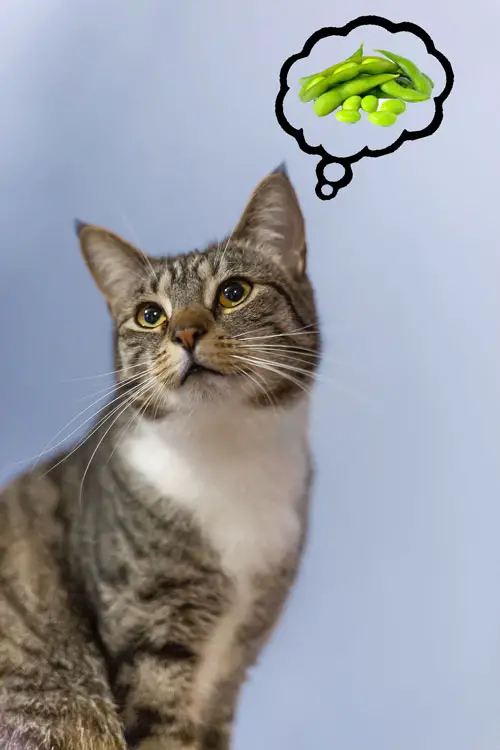
It’s worth noting that edamame is a plant-based food, whereas cats are obligate carnivores. Like all obligate carnivores, cats do not require plant-based foods in their diet. They can live exclusively from animal products, particularly lean meat.
A cat’s digestive system isn’t designed to process plant-derived compounds like cereals, green vegetables, fruits, and nuts. So, it doesn’t matter that edamame is non-toxic to cats. Or that the cereals pack some health and dietary benefits to your feline friend. There will always be some issues to be wary of.
Common side effects of edamame in cats include;
- Nausea and vomiting
- Appetite loss
- Diarrhea
- Upset stomach
- Bloating or flatulence
- Abdominal discomfort
These symptoms will vary in severity depending on the amount of edamame your feline friend has consumed.
The following are additional issues with feeding edamame to cats;
1. Allergic Reactions
Cats are allergic to numerous foods, and edamame is not entirely off the danger list. Although every cat is different, there are chances that your feline friend could be allergic to edamame and soybeans in general.
Edamame allergy is common among cats eating these vegetables for the first time. Common symptoms to watch out for include;
- Gastrointestinal issues like vomiting and diarrhea
- Respiratory problems like labored breathing, coughing, wheezing, and sneezing
- Skin irritation
- Irritability
So, are cats allergic to soy beans?
While every cat is unique, allergies to edamame and soybeans aren’t uncommon.
- High protein cat food dry formula with real chicken as the first ingredient
- Natural with prebiotic fiber nourishes specific intestinal bacteria for digestive health
- Wholesome cat food dry kibble with vitamin A and Omega-6 fatty acids to nourish skin and coat
Last update on 2024-10-18 / Affiliate links / Images from Amazon Product Advertising API
2. Risks of Weight Gain
Edamame is undeniably rich in fiber, which is known to combat weight gain. However, these cereals are also high in fats and calories. A 100-gram serving of frozen edamame contains up to 5.2 grams of fat and 121 kilocalories.
High-fat and calorie-dense foods are notorious for causing unintentional weight gain. They can also worsen the symptoms of various chronic ailments, such as obesity, diabetes, and heart disease.
The high fat content in edamame explains why diabetic cats should avoid these beans at all costs.
3. Kidney Damage
Homemade edamame is conventionally served with salt or saltwater, whereas processed edamame usually contains brine (concentrated salt solution) as a preservative.
Unfortunately, studies have shown that salt-laden foods could have disastrous consequences in cats. Salt consumption can trigger sodium-ion poisoning, a disease known to damage the kidneys. Therefore, cats with kidney disease should avoid edamame.
Symptoms of sodium-ion poisoning include frequent drinking and increased urine output. If the condition persists, it could cause seizures, coma, and eventually death.
If you ever discover that your cat has eaten salt-laden edamame, the first question that will fill your mind will be ‘my kitten ate an edamame bean and it had salt on it is he gonna be okay?’
Salt may be a condiment used in flavoring human foods. But the same is considered toxic to cats and dogs. So, your best bet is to contact your vet if you suspect that your kitto has ingested a significant amount of salt.
4. Choking Hazards
Edamame is typically prepared with its pods intact. But are the shells edible and if yes, can cats eat edamame pods or shells?
Although edamame can be consumed with the shells intact, the pods are actually tough, inedible, and may carry some choking hazards. So, cats should generally avoid edamame pods or shells.
Perhaps you’re always wondering, are edamame shells bad for cats?
As we’ve just pointed out, edamame shells are bad for cats as they could choke your feline friend.
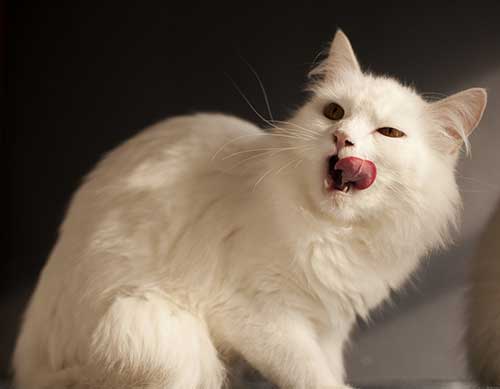
What of edamame husks, can cats eat edamame husks?
Edamame husks may also present choking risks.
Lastly, can cats eat edamame skin?
The term skin, with respect to edamame, commonly refers to the pods or shells. Since edamame skin might present some choking risks, it’s generally not advisable to give it to your cat.
Is Edamame Poisonous To Cats?
Edamame may carry several risks for your cat. But these cereal veggies aren’t poisonous or toxic to cats.
That also begs the question, is edamame bad for cats? And what of soybeans, are soy beans bad for cats too?
Edamame and soybeans are non-toxic to cats if fed in moderate amounts. In fact, adding some edamame to your cat’s diet occasionally is an excellent way of upping the animal’s intake of essential vitamins and nutrients.
However, edamame can be bad for cats if fed in excess.
Which Cats Shouldn’t Eat Edamame?
Edamame carries some health and nutritional benefits to cats. But the fact that these cereals are inherently plants makes them potentially harmful to cats if overfed. And as you shall find, some cats will experience more severe adverse effects of edamame poisoning than others.
Can kittens eat edamame?
Kittens shouldn’t eat edamame because of their sensitive digestive tracts and underdeveloped immunity.
Can elderly cats eat edamame?
Edamame may prevent old age diseases in cats like osteoporosis. However, the fact that senior cats already have a suppressed immune system means they could suffer serious consequences from consuming edamame.
Can sick cats eat edamame?
Sick cats shouldn’t eat edamame, at least until they’re well again. Pregnant cats and nursing cats shouldn’t eat edamame either. Again, it all has to do with reduced immunity.
Why do cats like edamame?
Edamame isn’t a common feline delicacy. So, curiosity is the main reason some cats like these cereals.
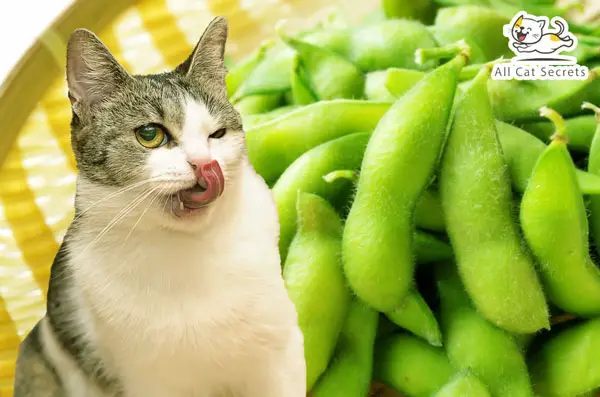
What Is the Best Way to Offer Edamame to Cats?
The best way to serve edamame to cats is to start by cooking the cereals first. Cooking helps to soften the beans, making them easier for your cat to digest.
Perhaps you’ve always wondered, can cats eat raw edamame?
Raw edamame isn’t toxic to cats. However, it can pose serious choking risks. That’s why experts recommend cooking the beans first before serving it to your cat.
It’s also important to choose the right cooking method. Insist on methods that don’t involve the use of salts, fat, spices, and any other ingredient known to be toxic to cats.
That begs the question, can cats eat baked edamame? And what of steamed edamame, can cats eat steamed edamame?
Boiling and steaming are the best ways to prepare edamame for cats. That’s because these cooking methods retain much of the cereal’s nutrients. However, you can also give your cat baked edamame provided you don’t include any toxic ingredients.
After cooking edamame, the next step is removing the shells, pods, and husks.
Lastly serve the cereals to your cat in moderation.
But how much edamame can cats eat?
Well, there’s no standard measure for the right amount of edamame to feed your cat. Just ensure you keep the portions low to avoid any adverse effects.
So, Is Edamame Good For Cats?
Edamame can be a healthy treat if served to cats in moderation. If you love these cereals and also happen to own cats, it’s important to understand how to feed edamame beans to your cat.
That includes cooking the beans using the recommended methods, removing the pods to prevent choking, and then serving them to your cat in small amounts.
Checkout Our Favorite Cat Products
1. Best Online Course For Cat Parents
Our favorite: The Cat Language Bible (How to Finally Understand And Speak to Your Cat) – A new form of cat to human communication that many cat owners have dreamed about… but few have actually thought possible.
2. Best Immune Support For Cats
Our favorite: Tomlyn Immune Support – Best Supplement for Cats and Kittens.
3. Best Cat Treats
Our favorites: LIFE ESSENTIALS All Natural Freeze Dried Chicken And Sheba Meaty Tender Sticks – Both are Great.

